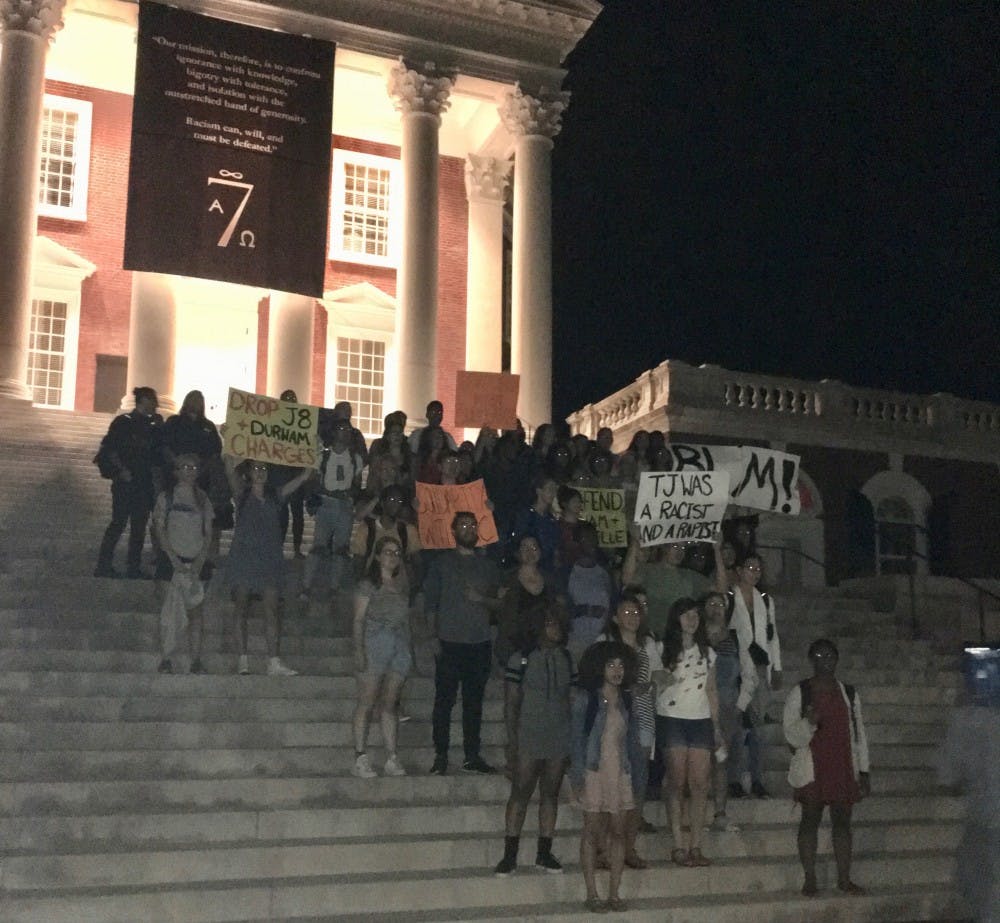Students and some members of the Charlottesville community gathered in Wilson Hall Thursday night for Disorientation #1: Defending Charlottesville from Fascism. A gathering on the steps of the Rotunda following the presentation ended with the arrival of University police due to a verbal confrontation between demonstrators and other students.
The structure of Disorientation, hosted by U.Va. Students United, was a question and answer session with a panel of racial and social justice activists to discuss the recent white nationalist movements in Charlottesville and the organization of counter-protests.
This is the second year U.Va. Students United has hosted Disorientation to discuss a wide range of topics about and affecting the University.
“Essentially this year it’s going to be a series of lecture-type events basically getting into the history of U.Va. that students often don’t know about and that the administration often does not want to engage with or talk about,” Clara Carlson, fourth-year College student and member of U.Va. Students United said.
The panel consisted of six individuals who were active in organizing counter-protests to the various white nationalist events that took place in Charlottesville over the summer including the Jul. 8 KKK rally, the Aug. 11 white nationalist march on the Lawn and the fatal “Unite the Right” rally of Aug. 12.
The panelists discussed how they organized their resistance efforts ranging from national support through Black Lives Matter to local grassroots movements. Kiara (Sizzle) Redd-Martin, founder of local activistism organization OperationS.E, emphasized the need to reach out to all members of the community and to have a plan.
“We have to remember that we need to be intentional about the work we have to do,” Redd-Martin said. “A movement will definitely be stifled if we are not strategic about who we’re linking up with.”
Tracye Redd, a member of Black Lives Matter in Washington D.C., further stressed solidarity and strength in numbers.
“We need to operate out of abundance … We need to tap into our full potential,” Redd said. “The support is here but you just need to ask for it.”
The panelists delved into the complexities and difficulties of uniting and inspiring people of all backgrounds against such tense and racialized issues. Many panelists expressed their strong disapproval of Charlottesville Mayor Mike Signer and University President Teresa Sullivan’s responses to recent events.
Sullivan acknowledged the missteps in the University’s response during an interview with The Cavalier Daily Tuesday. Signer publicly apologized Wednesday for some of the actions he’s taken post-“Unite the Right.”
“It brings division not only between Whites and Blacks but it brings division between Blacks and Blacks,” local music artist and activist Nay Nichelle said.
Nichelle, who is originally from South Carolina, moved to Charlottesville two years ago and drew attention to the racism she has experienced here and nowhere else.
“This is not southern pride, this is political pride,” Nichelle said. “These guys aren’t here just to play around, they’re here to put fear in your heart.”
The panelists continued a candid tone in calling out white supremacy wherever it exists.
“White people said ‘racists go home,’ as if racism does not live in Charlottesville,” Redd said.
The panelists concluded with demands for University students to take action and create change.
“Do not be afraid of white supremacy but acknowledge that it is real,” Nichelle said. “You are the students to fight back, you have a voice as well.”
Panelist Jay Scott, a member of the University staff at Runk Dining Hall, expressed a desire for more members of the Black community to engage in protests.
“In order for us to be stronger we need to reach out to the community and get more people in the community, like Black-wise, out there on the front lines,” Scott said.
Alternately, Redd called upon White students and individuals to fight more actively for the rights of targeted and marginalized groups. He endeavored everyone to help those who are different from them. “#DoBetter,” he told the crowd.
After the question and answer session with the panelists concluded, student leaders of the event invited those in attendance to gather on the front steps of the Rotunda to verbalize their opinions. Some students held posters with statements such as “BLM!” [Black Lives Matter], “TJ was a racist and a rapist” and “Drop J8 and Durham charges.” The group, led by a student with a megaphone, also chanted “Black Lives Matter,” “The people united will never be defeated” and “No Trump, no KKK, no fascist U.Va.”
After a period of offering the megaphone to any participant who wanted to express their thoughts, a group of three White male students passed by, one of which shouted something to the demonstrators.
A few demonstrators approached the student who spoke and engaged in a verbal confrontation. As the encounter persisted, the remaining members of the group descended the Rotunda steps to meet the other students.
An ambassador present at the scene proceeded to call the police.
Eventually the three students backed away from the demonstrators who were shouting at them to leave. Shortly after, student leaders of the event asked everyone to disperse and return to their homes. When the police officers arrived, they questioned the three students who engaged with the demonstrators.







